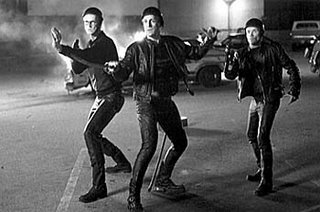give me that old time a-religion
in my last post, i tried to say something in favor of the kind of worries that gripped tolstoy's character levin (and tolstoy himself). there are a number of issues here, and my thoughts came out a bit jumbled, so i want to try again.
part of what interests me about levin's predicament is that it raises the question of nihilism. levin becomes preoccupied with the possibility that there is no meaning to life, no reason why he exists. or rather, he is troubled by the fact that his answer to the question of why he is alive -a scientific, materialistic answer- provides no guidance for how he should go about living his life. in fact, it undercuts other forms of guidance he has relied on, most importantly the orthodox christian faith of his youth.
from our vantage point, levin's encounter with nihilism may seem especially typical of the nineteenth-century (and perhaps especially in russia). we can think of ivan karamazov's quip that without god everything is permissible, or of lermontov's hero pechorin. we can also think of nietzsche's efforts to avoid a collapse into nihilism. in all of these cases, nihilism appears as a problem -perhaps the problem- for humanity, especially in the wake of the demise of religious belief.
now, what strikes me about many contemporary people -even very thoughtful people- is that nihilism no longer appears as a problem. it is not that we have solved levin's worries, but we have seen that these are not legitimate worries after all. either the 'death of god' does not lead to nihilism, or nihilism turns out to be not so bad after all. there is something quaint about getting all worked up about the (non)meaning of everything. nihilism, when it appears on the radar of many, does so mostly as a joke:

as christians, what ought our response be to this posture? i mean this as an intellectual question, but also as an interpersonal one. with regard to the former: do we think that belief in god -in the christian god?- is really necessary to keep one from failing into nihilism? or that if people just reflected more, they would be troubled the way levin was troubled? with regard to the latter: what does one say to a friend or neighbor who believes that there is no 'grand meaning' to life, but who is also untroubled by this?
i confess, i have a soft spot for old-school nihilism. but not everyone does. dietrich bonhoeffer, for one, seemed quite skeptical about the idea that as christians we should try to first provoke a crisis in people, and then use that as a way of leading them to faith. in his letters and papers from prison, he spoke of the 'world come of age.' part of his thought seems to be that christians should simply accept that humanity has 'grown up', so to speak, and no longer needs religion. i'm not sure, however, how to relate what bonhoeffer means by 'religion' to the kind of belief that levin arrives at as the solution to his personal crisis. for bonhoeffer, 'religion' is something private. it is also a kind of deus ex machina brought in to fill some gap in one's life. on at least one reading of bonhoeffer, his point is that modern people can now say of god in their personal lives what laplace said of god in his model of the solar system -'i have no need of that hypothesis.'
on the surface, it sounds as if bonhoeffer is rejecting precisely the kind of faith that levin arrived at, where religion comes in as the solution to a personal crisis. but maybe bonhoeffer's point is that religion ought not to fill any particular 'gap' in one's life, in the sense that it ought not be 'brought out' at weddings and funerals and then tucked away. that sort of religion is like the god of newton's solar system -it accounts for minor corrections to system. and that sort of religion is the kind that the world is better without. but levin's religious faith is not like that. rather, it is something that reshapes his whole way of understanding himself, the world, and how he should live.
part of what interests me about levin's predicament is that it raises the question of nihilism. levin becomes preoccupied with the possibility that there is no meaning to life, no reason why he exists. or rather, he is troubled by the fact that his answer to the question of why he is alive -a scientific, materialistic answer- provides no guidance for how he should go about living his life. in fact, it undercuts other forms of guidance he has relied on, most importantly the orthodox christian faith of his youth.
from our vantage point, levin's encounter with nihilism may seem especially typical of the nineteenth-century (and perhaps especially in russia). we can think of ivan karamazov's quip that without god everything is permissible, or of lermontov's hero pechorin. we can also think of nietzsche's efforts to avoid a collapse into nihilism. in all of these cases, nihilism appears as a problem -perhaps the problem- for humanity, especially in the wake of the demise of religious belief.
now, what strikes me about many contemporary people -even very thoughtful people- is that nihilism no longer appears as a problem. it is not that we have solved levin's worries, but we have seen that these are not legitimate worries after all. either the 'death of god' does not lead to nihilism, or nihilism turns out to be not so bad after all. there is something quaint about getting all worked up about the (non)meaning of everything. nihilism, when it appears on the radar of many, does so mostly as a joke:

as christians, what ought our response be to this posture? i mean this as an intellectual question, but also as an interpersonal one. with regard to the former: do we think that belief in god -in the christian god?- is really necessary to keep one from failing into nihilism? or that if people just reflected more, they would be troubled the way levin was troubled? with regard to the latter: what does one say to a friend or neighbor who believes that there is no 'grand meaning' to life, but who is also untroubled by this?
i confess, i have a soft spot for old-school nihilism. but not everyone does. dietrich bonhoeffer, for one, seemed quite skeptical about the idea that as christians we should try to first provoke a crisis in people, and then use that as a way of leading them to faith. in his letters and papers from prison, he spoke of the 'world come of age.' part of his thought seems to be that christians should simply accept that humanity has 'grown up', so to speak, and no longer needs religion. i'm not sure, however, how to relate what bonhoeffer means by 'religion' to the kind of belief that levin arrives at as the solution to his personal crisis. for bonhoeffer, 'religion' is something private. it is also a kind of deus ex machina brought in to fill some gap in one's life. on at least one reading of bonhoeffer, his point is that modern people can now say of god in their personal lives what laplace said of god in his model of the solar system -'i have no need of that hypothesis.'
on the surface, it sounds as if bonhoeffer is rejecting precisely the kind of faith that levin arrived at, where religion comes in as the solution to a personal crisis. but maybe bonhoeffer's point is that religion ought not to fill any particular 'gap' in one's life, in the sense that it ought not be 'brought out' at weddings and funerals and then tucked away. that sort of religion is like the god of newton's solar system -it accounts for minor corrections to system. and that sort of religion is the kind that the world is better without. but levin's religious faith is not like that. rather, it is something that reshapes his whole way of understanding himself, the world, and how he should live.


0 Comments:
Post a Comment
<< Home